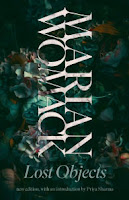 The Swimmers (one of the best ten SF books of 2021, The Sunday Times) and in the Walton & Waltraud uncanny mystery series The Golden Key (2020) and On the Nature of Magic (2023). Her short fiction has been collected in Lost Objects and Out of the Window, Into the Dark, nominated to two British Fantasy Awards and one British Science Fiction Association Award, and selected for Year’s Bests. She lives in Cambridge (UK).
The Swimmers (one of the best ten SF books of 2021, The Sunday Times) and in the Walton & Waltraud uncanny mystery series The Golden Key (2020) and On the Nature of Magic (2023). Her short fiction has been collected in Lost Objects and Out of the Window, Into the Dark, nominated to two British Fantasy Awards and one British Science Fiction Association Award, and selected for Year’s Bests. She lives in Cambridge (UK).
At Electric Lit Womack tagged eight titles about the quiet power of libraries and museums, including:
The Shadow of the Wind by Carlos Ruiz Zafón, translated by Lucia GravesRead about another entry on the list.
Twenty years after its publication in English in Lucia Graves’s delectable translation, The Shadow of the Wind hasn’t lost any of its charm, and remains a classic of the “secret library” sub-genre of books (such as Arturo Pérez-Reverte’s El Club Dumas and Sarah Waters’ Fingersmith) whichimagine the library as the physical shape of occult or mystical desires. Its young protagonist, a bookseller’s son, becomes obsessed with Julian Carax, an obscure, cursed author, and starts investigating what could have happened to him along with his vanished bibliography. When the young bookseller’s life becomes intertwined with the truths he starts to discover about Carax, reality and fiction are shown to be different sides of the same coin. At its heart, this engrossing novel is an ode to the transformative power of books and storytelling, masterfully articulating that wondrous moment of discovery we’ve all experienced when finding the book that turned us into readers. But The Shadow of the Wind is not simply about books—the library at its centre, the Cemetery of Forgotten Books, serves as a heart-wrenching metaphor for all that was lost under the long shadow of Franco’s dictatorship in Spain, and in particular for the shameful “pact of forgetting” that the democratic transition imposed on Spanish citizens, removing the possibility of restorative justice around the horrors of Franco’s regime. This is a novel that became a modern classic for all the right reasons.
The Shadow of the Wind is among Stuart Kells's top ten libraries in fiction and Bartholomew Bennett's top ten fictional booksellers.
--Marshal Zeringue